Le Haut Potentiel Intellectuel (HPI) est une personne neuroatypique qui a des capacités cognitives élevées (mesurées avec un score de QI supérieur ou égal à 130). Voilà la définition la plus simple.
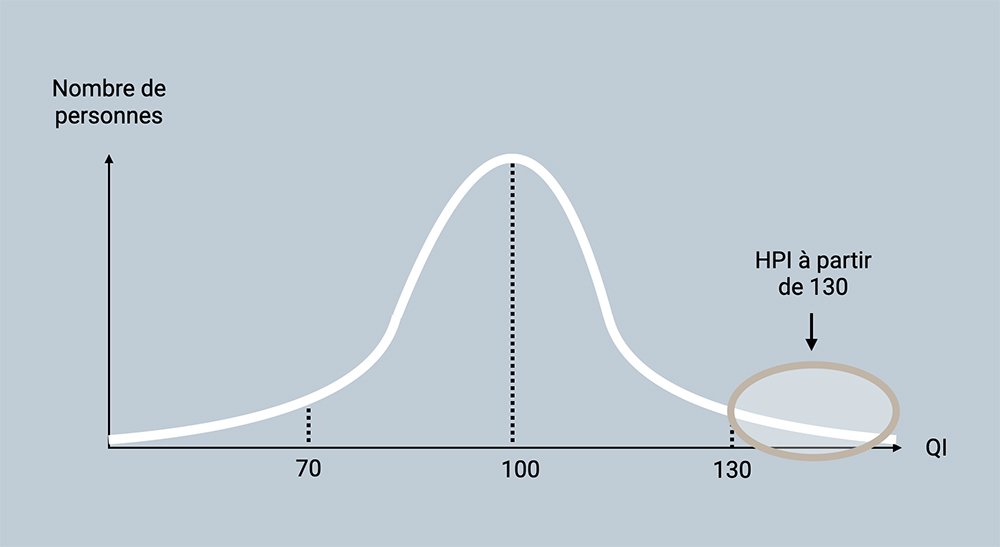
D’un point de vue purement « technique » (ou « biologique »), le cerveau des personnes surdouées est construit différemment. Les neurones communiquent mieux entre eux, et de manière plus rapide.
Ce « super cerveau » est un avantage dans certains moments de la vie, mais il peut également porter préjudice à la personne zèbre en psychologie (autre nom des surdoués).
C’est ce que nous allons voir dans ce guide sur les personnes qui souffrent d’ébullition mentale, parfois également appelée douance ou surdouance.
Quelles sont les caractéristiques du HPI ?
Comme je vous le disais en introduction, le cerveau d’une personne à haut potentiel intellectuel est construit différemment. Mais plus précisément, que veut dire être HPI ?
Les HPI ont de meilleures connexions neuronales
Les neurones communiquent entre eux via des axones. Ce sont des sortes de câbles qui permettent de faire passer l’information d’un neurone à l’autre.
Ces axones sont protégés par la myéline, qui a pour rôle d’accélérer et d’améliorer la transmission de l’information via l’axone.
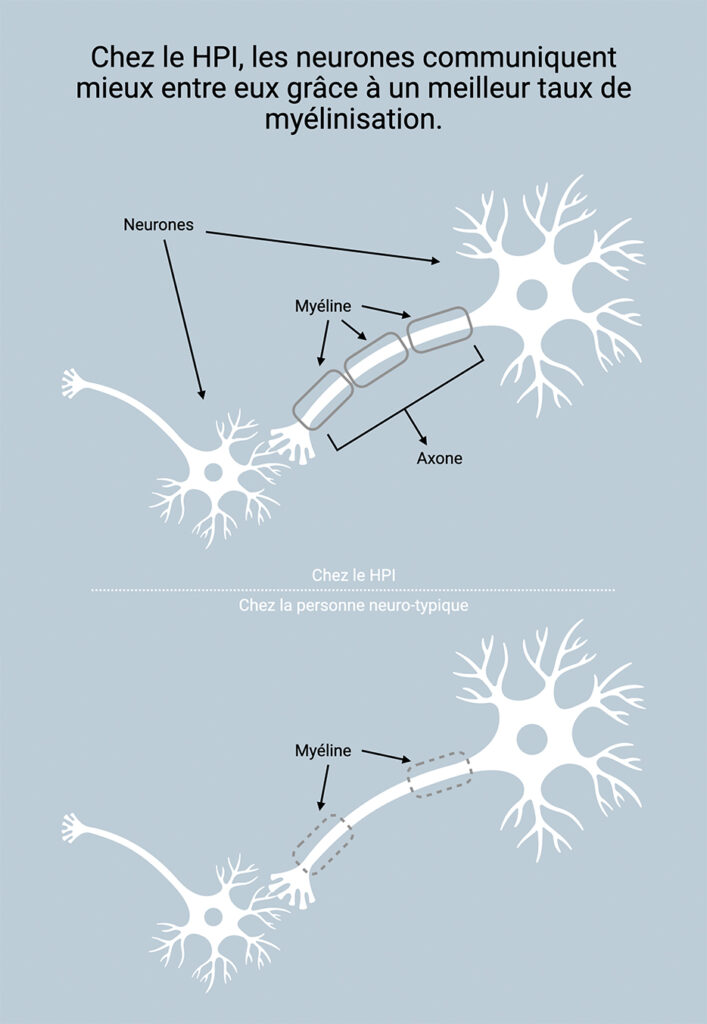
Chez les personnes surdouées, on remarque un plus haut taux de myélinisation du cerveau (source). Ça veut dire qu’il y a plus de myéline dans le cerveau des HPI, et que donc les neurones communiquent mieux entre eux (et plus rapidement).
Les deux hémisphères du cerveau d’un HPI communiquent mieux
Les deux hémisphères de notre cerveau sont séparé par le corps calleux.
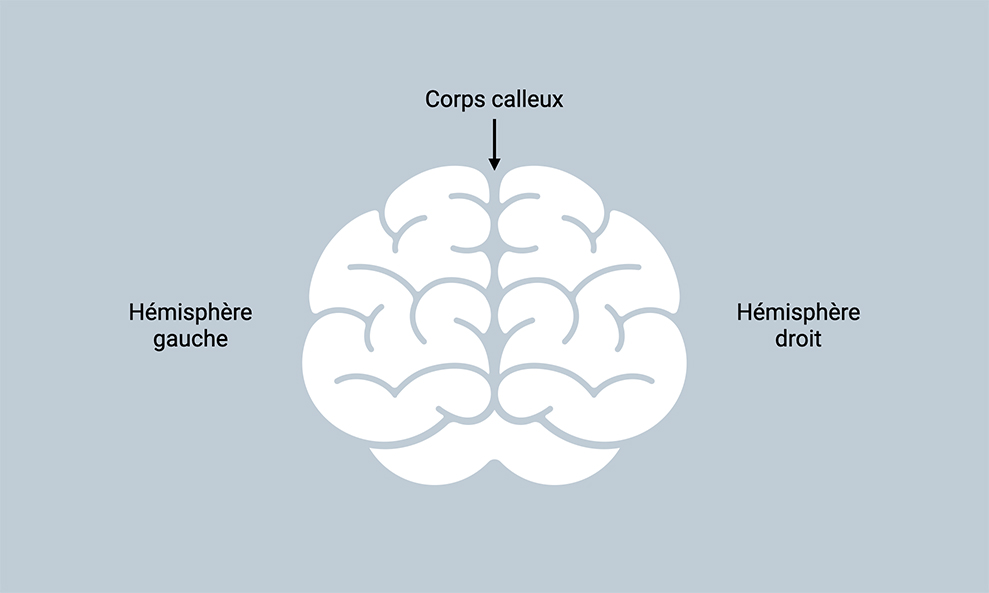
Ce corps calleux est normalement plutôt imperméable : il laisse mal passer les informations d’un hémisphère à l’autre.
C’est moins le cas pour les HPI (source).
Par exemple, en faisant passer des IRM à des enfants surdoués (des EIP avec une forte appétence pour les mathématiques), on s’est rendu compte que les différentes zones du cerveau sont plus activées que chez des enfants neurotypiques.
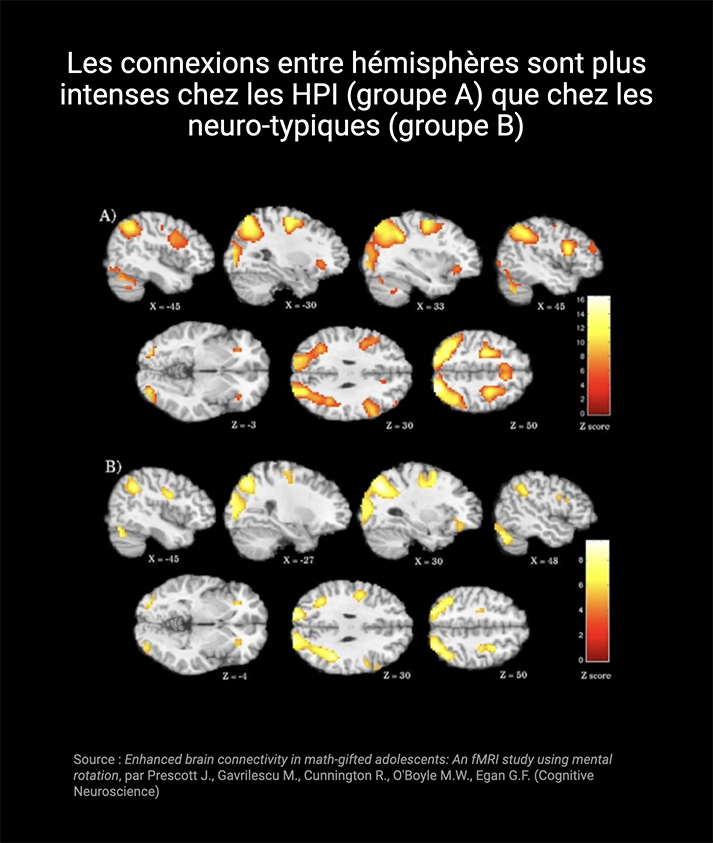
Les deux types de Haut Potentiel Intellectuel
En creusant plus loin dans la recherche scientifique, on se rend compte que les philo-cognitifs (autre petit nom pour les surdoués) :
- Ont de meilleurs résultats scolaires (sources 1 et 2), contrairement à la légende qui fait un lien entre précocité et échec scolaire ;
- Sont mieux payés une fois HPI adulte dans le monde du travail (source) ;
- Sont plus heureux au cours de leur vie (source) ;
- Vivent plus longtemps et en meilleure santé (source).
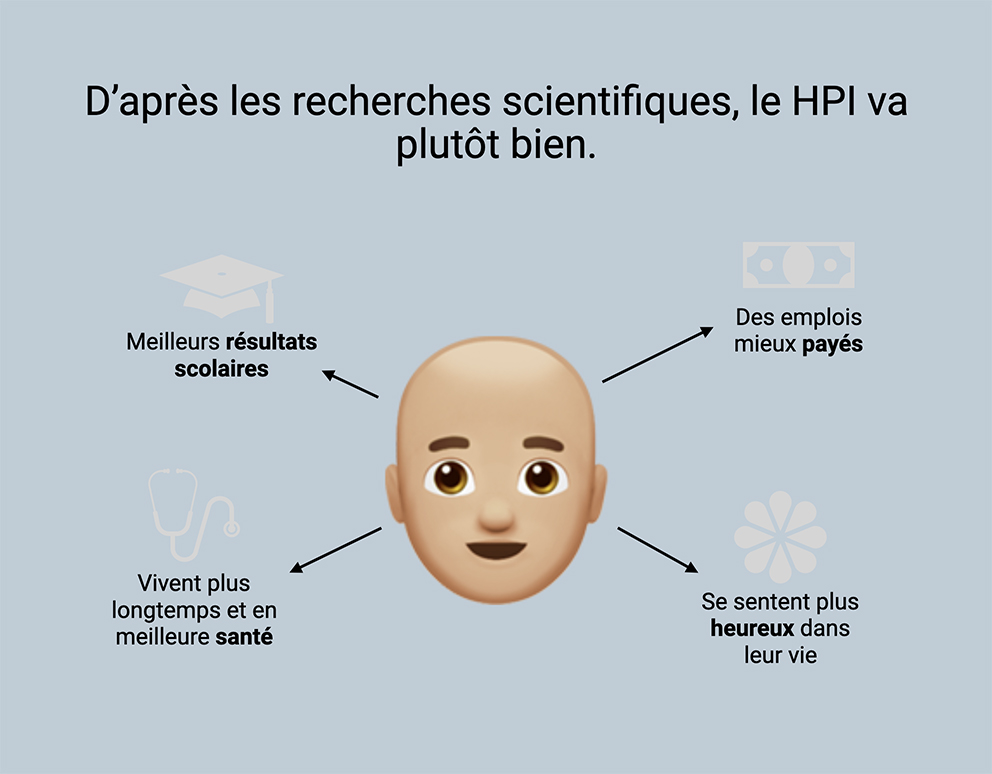
Visiblement, il n’y a pas que des inconvénients à être HPI !
Mais alors pourquoi voit-on souvent ce type d’articles autour des personnes à haut potentiel intellectuel ?
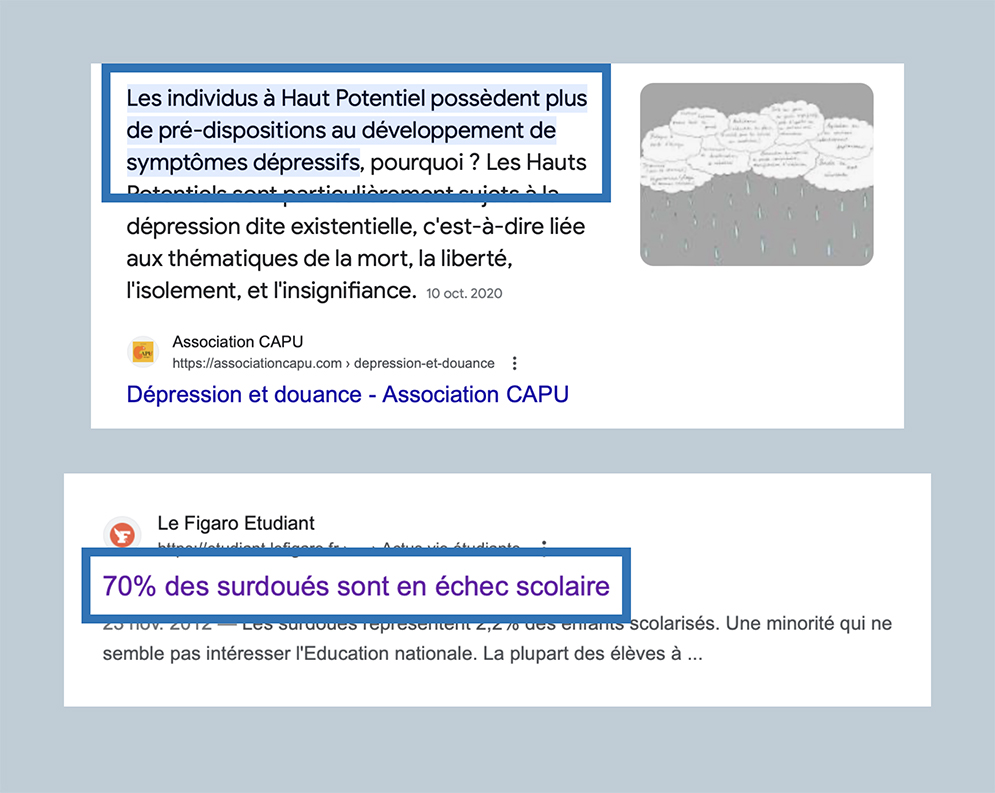
Ces contenus se basent principalement sur la connaissance clinique de ce profil neuro-atypique (à différencier de la connaissance scientifique dont je viens de parler plus haut).
Pour savoir que l’on est HPI, il faut passer un test de QI avec un(e) psychologue. Et pour prévoir d’aller chez un(e) psychologue, il faut (généralement) aller mal à un moment ou à un autre.
Les contenus grand-public sur le HPI, principalement relayés par des livres sur le HPI comme Trop Intelligent pour être Heureux ou L’Adulte Surdoué, sont créés par des psychologues qui, par définition, ne voient en consultation qu’une partie des surdoués. Ceux qui vont mal pour une raison ou une autre.
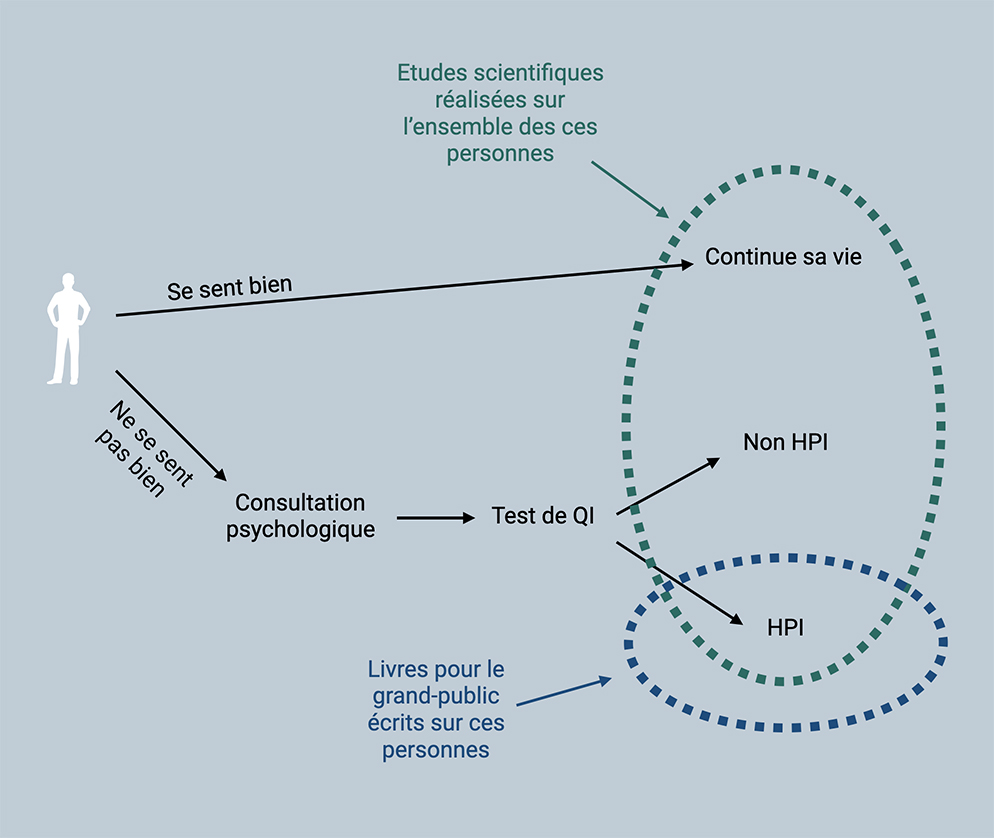
Les apports de la recherche clinique sur la personne zèbre
Attention, je ne dis pas que tout est à jeter dans la recherche clinique. Bien au contraire, elle est très utile car elle nous permet de mieux comprendre un HPI. On y découvre en quoi le « super cerveau » peut porter préjudice et qu’il peut être difficile de vivre avec un HPI. Ce sont les troubles du HPI.
Voici les points principaux pour lesquels les travaux de nombreux psychologues ont été importants et qui permettent de créer ce qu’on pourrait appeler le syndrome du HPI :
- Le HPI a une pensée en arborescence, c’est à dire que chaque idée lui ferait penser à plusieurs autres idées (de manière arborescente). Notez que ce point est mis à mal par la science, qui estime que l’on ne peut pas penser à plusieurs choses en même temps. Il s’agirait plutôt d’une pensée linéaire (comme tout le monde) mais beaucoup plus rapide.
- En essayant de rentrer dans les normes de la société, la personne atypique développe un faux-self. C’est un concept développé par le psychologue britannique Donald Winnicott que l’on pourrait apparenter à un masque social. D’après le psychologue, cela pourrait conduire à de la dépression.
- Grâce à son hypersensibilité (j’y reviendrai un peu plus bas) et à sa grande capacité d’analyse, le surdoué a ce qui pourrait s’apparenter à une extra-lucidité.
- Le déficit d’inhibition latente est une problématique que rencontrent beaucoup de personnes surdouées car ils ont du mal à se concentrer sur une seule chose à la fois. Leur cerveau ne sait pas hiérarchiser les informations qu’il reçoit. Cela peut ressembler parfois à un trouble de l’attention voire à un TDAH.
- Le HPI et l’Injustice sont très liés car les personnes surdouées ont horreur de l’injustice.
- Les personnes à Haut Potentiel Intellectuel sont perfectionnistes, et souffrent souvent d’un fort sentiment de décalage avec les autres (c’est très vrai chez la femme HPI). De plus, souvent le HPI a des difficultés relationnelles.
- Les comportements amoureux de l’adulte surdoué sont plus intenses, avec une tendance à la sapiosexualité.
- L’adulte à haut potentiel et l’ennui sont très liés. Cela est également vrai pour les enfants précoces et peut être la source de difficultés scolaires (l’enfant HPI s’ennui et donc fait autre chose).
- Le stress est souvent très présent car le surdoué analyse de tout, se pose beaucoup de questions et a du mal à se reposer. Le lien entre HPI et sommeil est encore peu connu, mais mériterait que l’on s’y plonge car, à titre personnel, beaucoup de personnes viennent me voir en me disant « Je n’arrive pas à dormir, je pense trop ».
Toute cette signification parallèle de ce qu’est un profil HPI n’est pas à oublier, loin de là. Elle montre, pour certains, des signes d’intelligence supérieure et permettrait de reconnaître un HPI.
Comment savoir si on est une personne HPI ?
Passons à la question que beaucoup se posent : comment savoir si on est HPI ?
Il y a deux approches qui permettent de savoir si on est une personne zèbre : le bilan de détection du HPI et le test de QI. Cependant, ces deux approches ne se valent pas toujours.
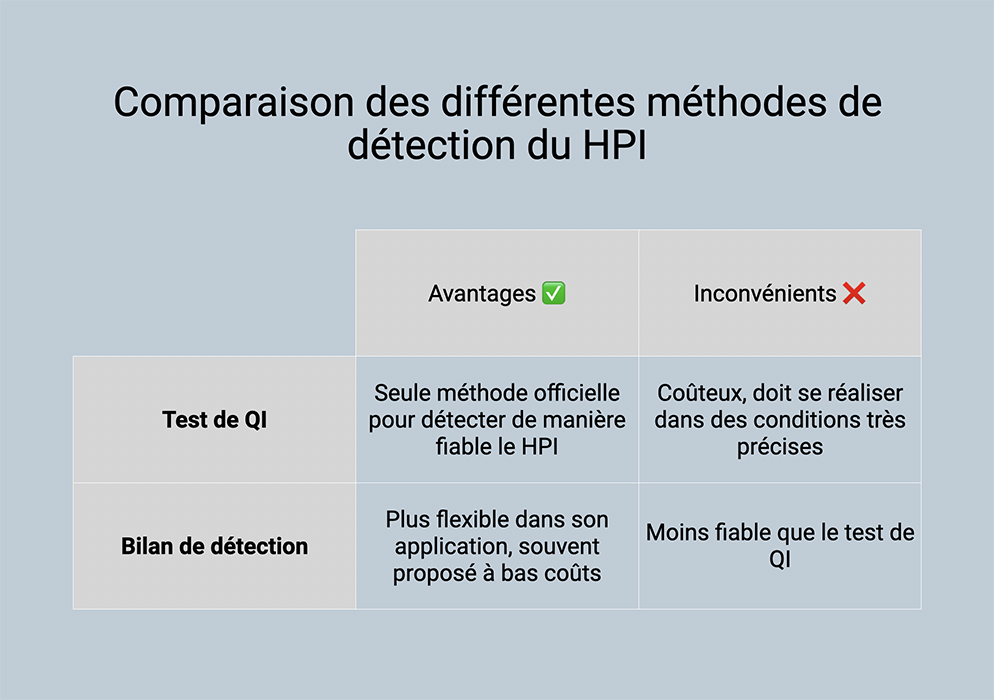
Le test de QI (WAIS)
Je vous en parlais plus haut, on est dit à Haut Potentiel Intellectuel avec un quotient intellectuel supérieur ou égal à 130 (le QI moyen ou QI normal est de 100). On parle même de THQI (Très Haut Quotient Intellectuel) à partir de 145.
Ce quotient intellectuel se mesure avec le test de QI officiel : la WAIS (on utilise la WISC pour les enfants zèbres). C’est, à ce jour, le seul moyen de connaître son QI.
Le test HPI se déroule en 3 étapes :
- Un entretien préparatoire avec votre psychologue pour définir l’objectif du bilan psychométrique ;
- La passation du test, qui est lui-même composé de sous-tests. En fonction de vos différents scores, vous pourrez savoir si vous êtes un HPI laminaire ou complexe ;
- L’entretien final dans lequel votre psychologue vous fera un compte rendu détaillé du fonctionnement de votre cerveau – et vous donnera votre score final pour savoir si vous avez un haut quotient intellectuel.
Si vous êtes intéressé(e) par un diagnostic HPI, vous pouvez prendre rendez-vous directement avec un psychologue spécialisé HPI. qui sera par ailleurs une excellente sources d’infos sur le HPI.
Le bilan de détection du HPI
Le bilan de détection ou (test de douance) est basé sur les travaux cliniques. Au lieu de chercher à mesurer le QI d’une personne, on cherche à identifier les similarités avec les critères du Haut Potentiel Intellectuel, les signes du HPI.
De nombreux bilans de détection et tests HPI sont disponibles. En voici par exemple un à faire soi-même, et qui est totalement gratuit.
Vous pourrez par ailleurs trouver de nombreux autres bilans, tests de QI gratuits et tests de neurodivergence en ligne. Attention par contre, leur fiabilité est limitée.
Notez également qu’il sera parfois question de la différence entre HPI et surdoué. En réalité, il s’agit de la même chose. On cherche toujours à identifier les symptômes du HPI.
Enfin, on parle de détection de la douance car le HPI n’est pas une maladie mentale (il ne se diagnostique pas).
Quel est le lien entre Haut Potentiel Intellectuel et Hypersensibilité ?
Concernant le lien entre hypersensibilité et Haut Potentiel Intellectuel… c’est plus compliqué.
On sait que 2,5% de la population est HPI (cf courbe de QI plus haut et les statistiques du HPI), et que 15 à 20% de la population est hypersensible (source).
Il y a donc plus de personnes hypersensibles que de personnalités HPI. Techniquement, tous les HPI pourraient être hypersensibles, mais tous les hypersensibles ne pourraient pas être HPI.
Mais dans quel situation se trouve-t-on ? Est-ce qu’aucun HPI n’est hypersensible ?
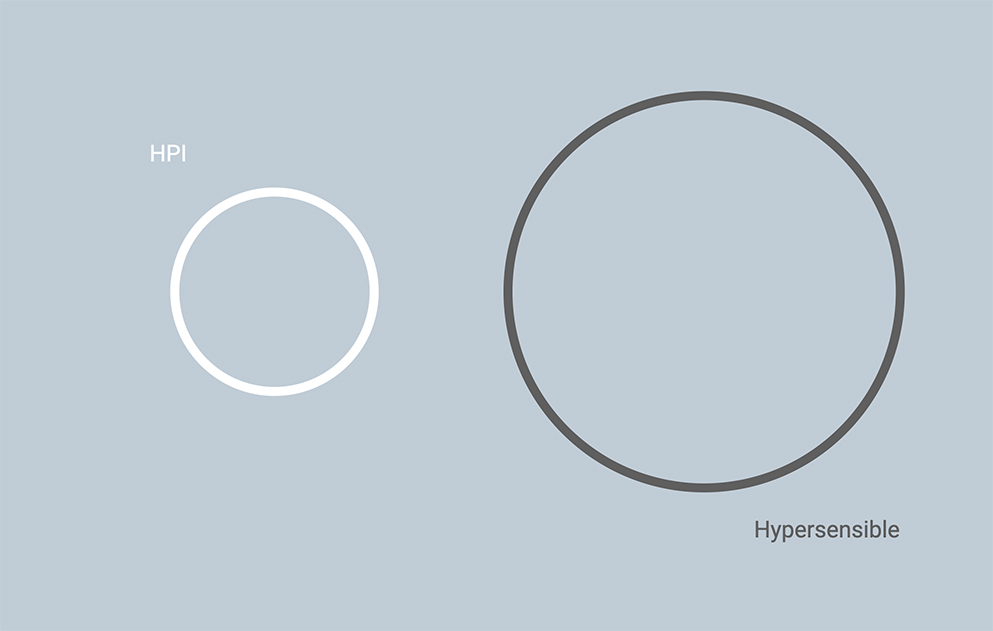
Ou alors est-ce que seulement une partie des HPI sont hypersensibles ?
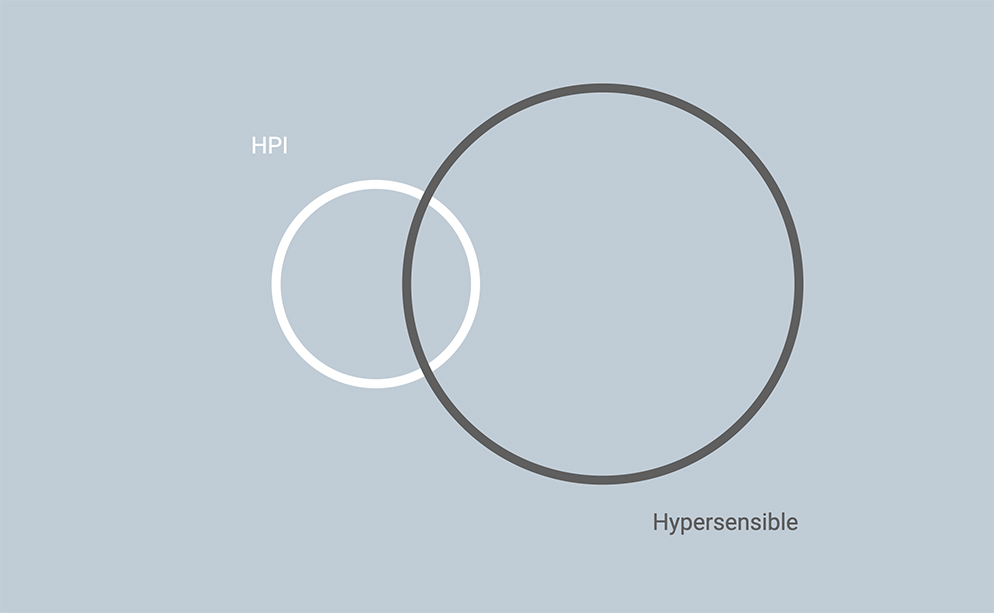
Ou troisième option : tous les HPI sont hypersensibles ?
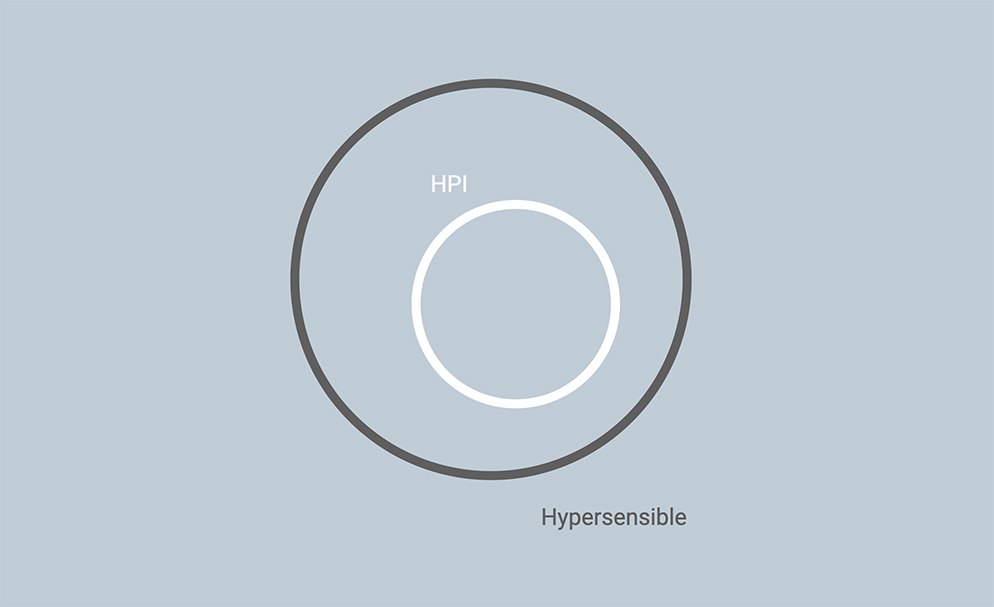
Le problème, c’est que personne n’est d’accord pour nous aider à résoudre cette question.
Dans Mon Cerveau est Hyper, la neuro-psychologue Cathy Assenheim explique que seuls 20% des HPI sont hypersensibles. Pour Jeanne Siaud-Facchin (psychologue clinicienne), c’est 100%
Et même les scientifiques ne sont pas d’accord ! Certains expliquent que les HPI ne sont pas hypersensibles (source), alors que pour d’autres 95% le sont (source).
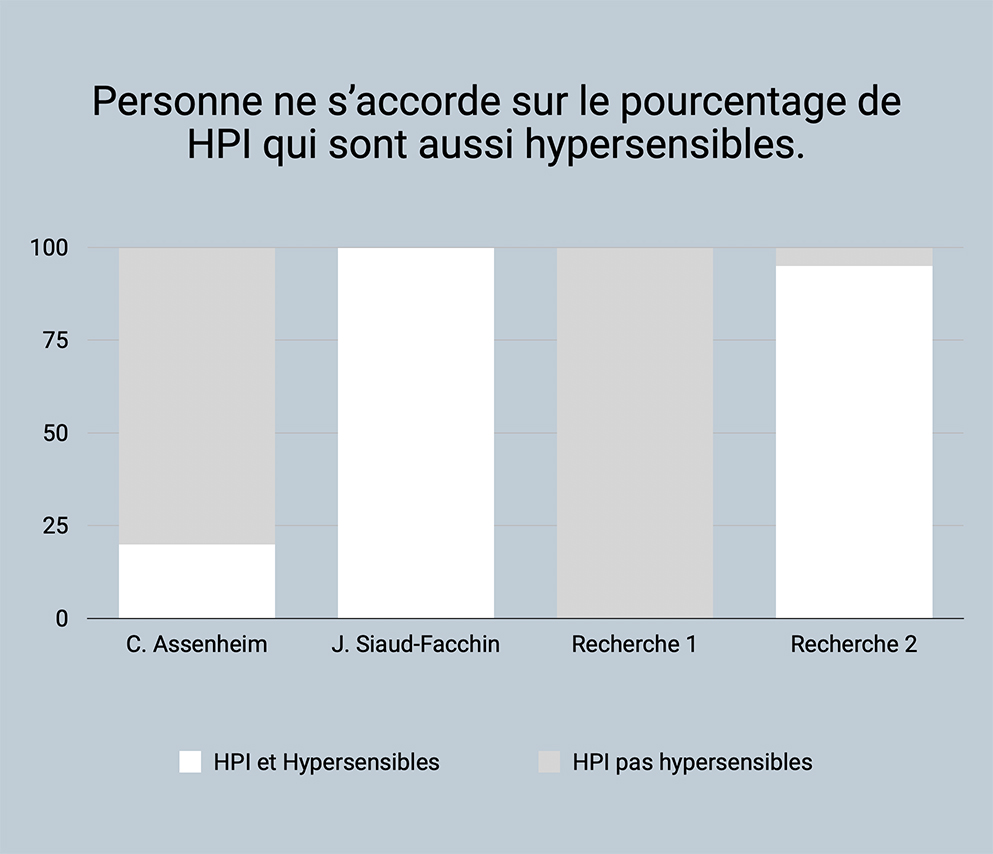
Bref, à ce jour on connaît la différence entre HPI et HPE, mais le lien entre eux est plus complexe.
Le HPI est-il un effet de mode ?
Suite à la diffusion de la série HPI sur TF1 qui explose les records, on peut se demander : le HPI est-il un effet de mode ?
À mon sens non. Ceci dit, la série a permis à de nombreuses personnes de se familiariser avec le concept de neuroatypie.

On détecte de plus en plus, et c’est une bonne chose. Beaucoup de personnes qui, sans cet « effet de mode » seraient restées en souffrance sans comprendre ce qui leur arrivait ont pu aller mieux.
Pour ça, c’est top.
D’ailleurs, si vous êtes dans cette situation, je vous invite à jeter un coup d’oeil à mon super nouveau livre Je Suis HPI dans lequel vous retrouverez des dizaines et des dizaines de conseils à appliquer dans votre quotidien pour calmer votre cerveau en ébullition.
Entretiens avec des personnalités atypiques
Au fur et à mesure de mon activité sur le web (via le site sur lequel vous êtes), j’ai eu l’occasion de m’entretenir avec de nombreuses personnes à Haut Potentiel Intellectuel à travers la francophonie.
Voici quelques échanges filmés.
William, jeune prodige de 21 ans est venu partager son vécu autour de sa scolarité et de ses découvertes
